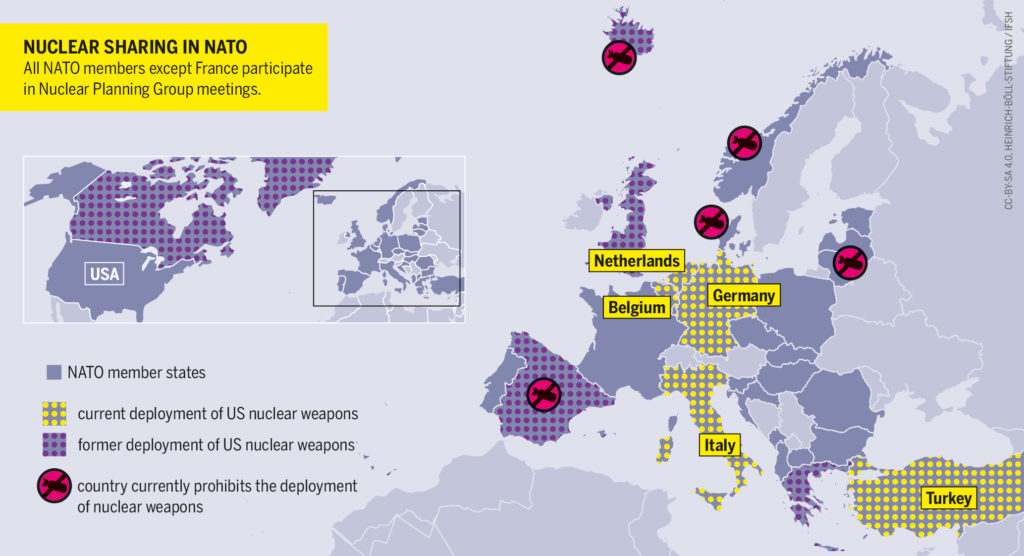
The North Atlantic Treaty, NATO’s founding document, makes no mention of nuclear weapons. NATO’s strategic concept defines the use of nuclear weapons for Alliance defense purposes. The strategic concept is a policy document that in the past was rewritten by the member states roughly every ten years. In addition, NATO summit declarations describe partial changes in between. In February 2021, the NATO Secretary General proposed that NATO adopt a new strategic concept at the 2022 summit.
Currently, NATO assesses the likelihood of nuclear weapons use as very low. For deterrence, NATO relies on the strategic weapons of the US, the UK, and France, as well as so-called nonstrategic weapons stationed in other NATO countries – such as the bombs in Germany.
Shortly after the first deployment of nuclear weapons in Europe, NATO countries demanded a say in nuclear weapons deployment planning. This gave rise to the Nuclear Planning Group (NPG), which discusses and reviews NATO’s nuclear weapons policy principles. All NATO members except France participate in the deliberations, usually at the level of defense ministers. Results of NPG meetings were published in final documents up until 2007. There has been no official reporting since then. The High Level Group and the NPG Staff Group are bodies where meetings are prepared at a lower level.

NATO’s strategic concepts have been public documents since 1991. They are always supplemented by secret documents explaining the military implementation of the political objectives. The NATO Military Committee prepares and adopts these documents. The latest such document (presumed document number: MC 400/4) was adopted in 2019 as a new “military strategy”. NATO had not had such a military strategy for over five decades.
The following FAQ is a compilation of a number of further questions about nuclear planning. The questions are taken from formal Bundestag inquiries, and the answers stem from the respective replies by the federal government.
For security reasons, information policy regarding NATO’s nuclear forces is subject to the Alliance’s mandatory secrecy rules, to which the German government is bound in continuity with all its predecessors.
All decisions regarding nuclear sharing are made in close consultation with allies in the respectively responsible bodies.”
Answer translated from: minutes of the plenary session of the Bundestag, 19/165, session on June 17, 2020
For security reasons, information policy regarding NATO’s nuclear forces is subject to the Alliance’s mandatory secrecy rules, to which the German government is bound in continuity with all its predecessors.
All decisions regarding nuclear sharing are made in close consultation with allies in the respectively resbodies responsible for them.”
Answer translated from: minutes of the plenary session of the Bundestag, 19/165, session on June 17, 2020
Answer translated from: minutes of the plenary session of the Bundestag, 18/45 session on July 2, 2014
Answer translated from: minutes of the plenary session of the Bundestag, 18/45 session on July 2, 2014
Answer translated from: minutes of the plenary session of the Bundestag, 18/45 session on July 2, 2014
“Then-Federal Minister of Defense, Dr. Peter Struck, made intensive preparations for the meeting of the Nuclear Planning Group on June 9, 2005 and also held preparatory talks for this purpose. The meetings of this body of NATO – as well as the other bodies in this context – are subject to secrecy. Therefore, no further comment can be made here on the statements made there by Dr. Peter Struck and the other defense ministers of the Atlantic Alliance.”
Answer translated from: reply of the federal government to an inquiry by the MPs Dr. Norman Paech, Alexander Ulrich, Paul Schäfer (Cologne), further MPs and the Linke party parliamentary group (Bundestag document 16/568)
Answer translated from: reply of the federal government to an inquiry by the MPs Winfried Nachtwei, Alexander Bonde, Jürgen Trittin, further MPs and the parliamentary group Alliance 90/The Greens (Bundestag document 90/ 16/9834)
Answer translated from: reply of the federal government to an inquiry by the MPs Winfried Nachtwei, Alexander Bonde, Jürgen Trittin, further MPs and the parliamentary group Alliance 90/The Greens (Bundestag document 90/ 16/9834)
“For security reasons, information policy regarding NATO’s nuclear forces is subject to the Alliance’s mandatory secrecy rules, to which the German government is bound in continuity with all its predecessors. Consequently, no information can be provided on the number, storage locations, handling, and specifics of nuclear weapons and their delivery systems, as well as on training, exercises, and safeguards. Moreover, statements and speculations in this regard can neither be confirmed nor denied.
In addition to infrastructural, technical, and procedural measures, this policy of secrecy serves to prevent unlawful attacks and disturbances that could lead to risks to the population and the environment, thus providing the highest level of protection and security. In accordance with the Alliance’s unchanged secrecy rules and in line with past practice, the federal government will therefore continue to adhere to the tried and tested principle of secrecy for security reasons.”
Answer translated from: preliminary remarks of the federal government in its reply to the inquiry by the MPs Dr. Marcus Faber, Alexander Graf Lambsdorff, Grigorios Aggelidis, further MPs and the parliamentary group of the FDP (Bundestag document 19/9353)